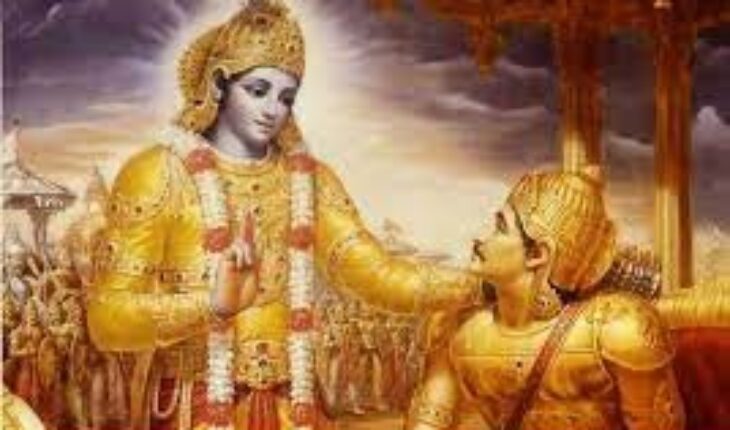
Bhagavad Gita in shlokas from 2.54 to 2.72 has spelled out the distinctive attributes of an enlightened person, the one who has steady intellect and who is forever situated in divine consciousness. It has also been explained as to how can such a state of blessedness be obtained.
While describing the characteristics of an enlightened person, it has been stated that when one gives up all his selfish desires and when his soul is content in itself ; then he is called a man of steady intelligence (sthita-pragya). The one whose mind remains unperturbed in the midst of sorrow, who does not crave for pleasure ; and who is free from attachment, fear and anger – such a person is called a sage of steady wisdom (sthita-dhih). The one who remains unattached under all conditions and is neither delighted by good nor dejected by evil, he is firmly fixed in perfect knowledge (pragya-pratishthita). The one who having brought all his senses under full control fixes his consciousness upon the Supreme Lord, he is also known as pragya-pratishthita.
Sri Krishna in these shlokas has further explained as to what are the obstacles in achieving the steady wisdom and spiritual liberation, and how can these obstacles be overcome. Attachment towards objects of the senses gives rise to afflictions of the mind like desire, anger and greed etc. ; which, in turn, results in destruction of intelligence. The cravings of the senses are so strong that they can forcibly carry away the mind even of a wise man. Citing the example of a boat on water which is swept away by strong wind, it has been stated that even one of the senses, which is wandering on the objects and on which the mind is constantly fixed, can carry away a man’s intelligence. He whose senses are all withdrawn from their objects, certainly remains steady in intelligence (pragya-pratishithita). Therefore, the one who wants his wisdom to be stable has been advised to withdraw his senses from their objects in every respect, as a tortoise draws its limbs, on all sides, into its shell.
Sri Krishna in these shlokas has also talked about peace and joy. Just as sea remains motionless even while rivers are entering it, similarly only those who remain unmoved by desires can attain peace ; and not the slaves of desires. For the one who does not have a disciplined mind, there can neither be any stability in intelligence nor any power of concentration. There can be no peace or happiness for such a person.
It has been stated that a spiritual aspirant may restrain the senses from the sense objects, but the taste for their enjoyment still remains. However, even this taste vanishes, when the Supreme is seen. But how can one see the Supreme ? The one who has abandoned all desires, who is free from longing, who has no sense of ownership ; and who is devoid of any false ego – only such a person can attain perfect peace. This is stated to be the divine state (brahmisthiti), having attained which one is not bewildered. Being established in that till the end, one attains the bliss of God (brahmanirvana). In other words, a realised soul obtains not merely an outer abstention but also inner renunciation. He remains in full control, not only of the body but also of the mind. He is always guided by vivek (spiritual discrimination).
Bhagavad Gita does not promote a life of isolation or otherworldliness. It does not look down upon the worldly enjoyments. It only advocates self-control. It has been stated that the one who even while experiencing sense objects keeps senses under control by shunning likes and dislikes, he attains purity of spirit. And the purity of spirit erases all sorrows. Intelligence of such a joyful person quickly gets firmly established (buddhi-paryavatishthata).
An enlightened person does not suffer pain because he does not hanker after pleasure. His joy is from within. His delight is long lasting as it does not depend upon outside objects or external circumstances.
A question is often asked as to whether the ideals described in the above shlokas can serve any real purpose in day to day life of a common man. Is it humanly possible to achieve such an equanimous and steady state of mind, even while remaining physically and mentally competitive, in this world of fierce competition ? The one who internalises the essential meaning of these shlokas and tries to follow them to the extent possible, he can himself vouch for the practical benefits of the Gita teachings. When one has a clear mind, is free from attachment, fear and anger, is endowed with patience, whose senses are under control and whose mind is focused, who remains content in himself – such a person of illumined intelligence and unwavering resolve puts in his hundred percent in whatever he does. He is likely to excel in all his endeavours.
To conclude, Bhagavad Gita has laid down, in clear terms, the principles of a self-disciplined, focussed, even-tempered, intelligent, aware, tranquil and joyous living. The one who subdues his ego, he is freed from the troubles of earthly existence. When one fixes his consciousness on the Supreme ; he obtains divine love, divine knowledge and divine bliss. The wisdom of the Gita is equally applicable for all, without any consideration of class, creed or gender etc. One is benefitted, to the extent he adheres to these mantras of leading a meaningful and purposeful life.





